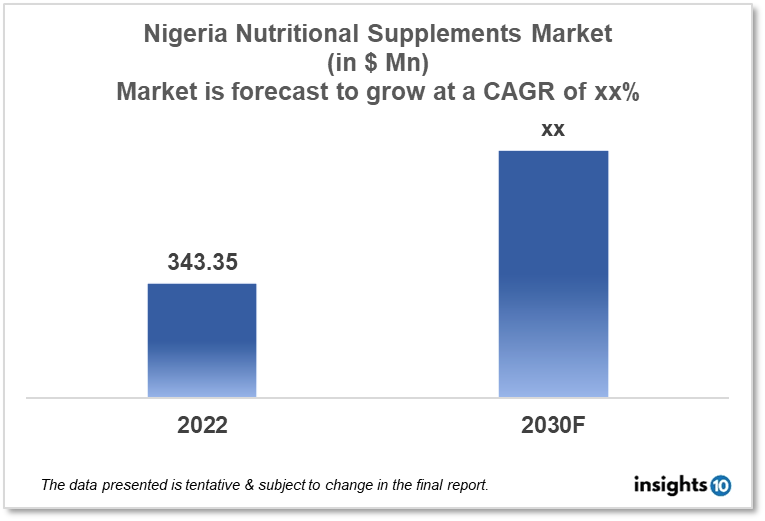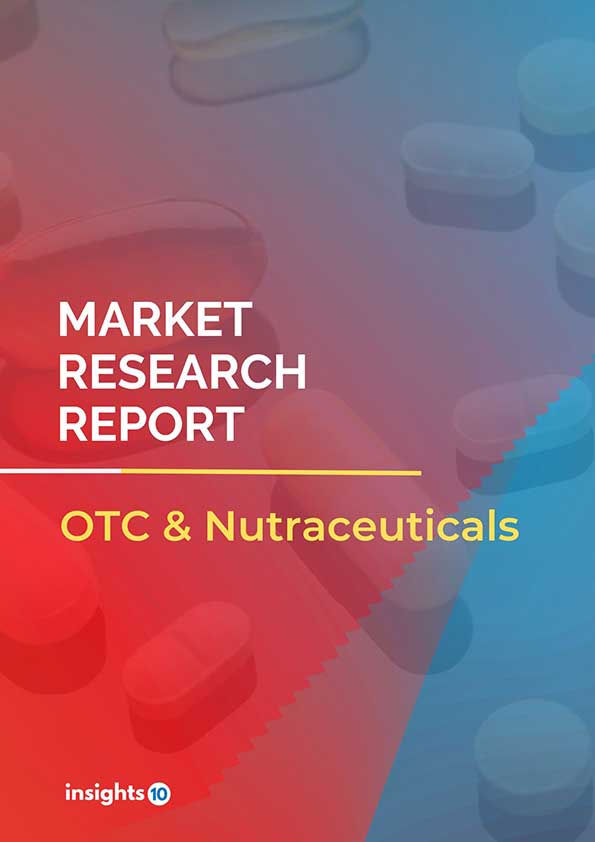Nigeria Nutritional Supplements Market Analysis
By 2030, it is anticipated that the Nigeria Nutrition and Supplements market will reach a value of $xx Mn from $343.35 Mn in 2022, growing at a CAGR of xx% during 2022-2030. The nutritional supplements market in Nigeria is primarily dominated by local players such as Fidson Healthcare, Swiss Pharma Nigeria, and Neimeth International. The market for nutrition and supplements in Nigeria is primarily driven by an inclination towards better health infrastructure, government regulations and increasing consumer awareness of health and lifestyle. The Nigeria nutrition and supplements market in Nigeria is segmented by Type, Product, application, and Distribution Channel.
Buy Now

Nigeria Nutrition and Supplements Market Analysis Summary
By 2030, it is anticipated that the Nigeria Nutrition and Supplements market will reach a value of $xx Mn from $343.35 Mn in 2022, growing at a CAGR of xx% during 2022-2030.
Nigeria is a lower middle-income developing country located in West Africa with a coast on the Gulf of Guinea and the Atlantic Ocean. Vitamins and minerals are the most often utilised dietary supplements in Nigeria, followed by herbal and traditional supplements and speciality supplements such as omega-3s and probiotics. Sports nutrition supplements such as protein powders, amino acids, and pre-workouts are also becoming more popular.
Nigeria is also a member of the Economic Community of West African States (ECOWAS), which has its own food and dietary supplement rules. NAFDAC collaborates closely with other member states to ensure that Nigeria's regulations meet ECOWAS standards. Nigeria's government spends 3.4 % of its GDP on healthcare.

Market Dynamics
Market Growth Drivers Analysis
The most widely cited motivations for consuming dietary supplements, according to a survey performed by the Nigeria National Bureau of Statistics (NBS), are to enhance overall health and to address particular health concerns such as weariness, joint pain, and high blood pressure. Nigeria is the most populated country in Africa and a prominent African power in terms of GDP, which enhances the client base for the nutritional supplement market. These aspects could boost Nigeria's nutrition and supplement market.
Market Restraints
Concerns have been raised about the safety and quality of dietary supplements sold in Nigeria. The Nigerian government has taken steps to regulate the business, including the establishment of the National Agency for Food and Medicine Administration and Control (NAFDAC), which is in charge of guaranteeing the safety and quality of all food and drug products, including dietary supplements. Manufacturing activity accounts for only 10% of Nigeria's GDP, despite the Made in Nigeria (MINE) project's goal of increasing it to 20%. These factors may deter new entrants into the Nigerian nutrition and supplement market.
Competitive Landscape
Key Players
- GSK Nigeria (NGA)
- May & Baker Nigeria (NGA)
- Fidson Healthcare (NGA)
- Neimeth International Pharmaceuticals (NGA)
- Swiss Pharma Nigeria Limited (NGA)
- Biofem Pharmaceuticals Nigeria Limited (NGA)
- GNC
Healthcare Policies and Reimbursement Scenarios
The National Agency for Food and Drug Administration and Control (NAFDAC) is the regulatory organisation in Nigeria in charge of nutrition and supplement regulations. Aside from NAFDAC, the Standards Organization of Nigeria (SON) regulates nutrition and supplement goods in Nigeria. SON establishes standards for a wide range of items, including food and dietary supplements, and collaborates closely with NAFDAC to ensure that regulations adhere to national and international standards. Nigeria is also a member of the Economic Community of West African States (ECOWAS), which has its own food and dietary supplement rules. NAFDAC collaborates closely with other member states to ensure that Nigeria's regulations meet ECOWAS standards.
In Nigeria, there is no established reimbursement mechanism for nutritional supplements and medicinal meals. The healthcare system in Nigeria is essentially the responsibility of the government, and health services are generally available to all citizens and residents. However, the availability of nutritional supplements and medicinal meals may vary based on the product and the medical condition.
1. Executive Summary
1.1 Product Overview
1.2 Global Scenario
1.3 Country Overview
1.4 Healthcare Scenario in Country
1.5 Government Regulation in Country
1.6 Recent Developments in the Country
2. Market Size and Forecasting
2.1 Epidemiology of Disease
2.2 Market Size (With Excel and Methodology)
2.3 Market Segmentation (Check all Segments in Segmentation Section)
3. Market Dynamics
3.1 Market Drivers
3.2 Market Restraints
4. Competitive Landscape
4.1 Major Market Share
4.2 Key Company Profile (Check all Companies in the Summary Section)
4.2.1 Company
4.2.1.1 Overview
4.2.1.2 Product Applications and Services
4.2.1.3 Recent Developments
4.2.1.4 Partnerships Ecosystem
4.2.1.5 Financials (Based on Availability)
5. Reimbursement Scenario
5.1 Reimbursement Regulation
6. Methodology and Scope
Nutritional Supplements Market Segmentation
The Nutritional Supplements Market is segmented as mentioned below:
By Product (Revenue, USD Billion):
- Sports Nutrition
- Sports Food
- Sports Drinks
- Sports Supplements
- Fat Burners
- Green Tea
- Fiber
- Protein
- Green Coffee
- Others (Turmeric, Ginseng, Cranberry, Garcinia Cambogia)?
- Dietary Supplements
- Vitamins
- Minerals
- Enzymes
- Amino Acids
- Conjugated Linoleic Acids
- Functional Foods
- Probiotics
- Omega-3
- Others
By Consumer Group (Revenue, USD Billion):
- Infant
- Children
- Adults
- Pregnant
- Geriatric
By Formulation (Revenue, USD Billion):
- Tablets
- Capsules
- Powder
- Softgels
- Liquid
- Others
By Delivery Channel (Revenue, USD Billion):
- Chemists/Pharmacists
- Direct-to-Consumer Sales
- E-commerce
Methodology for Database Creation
Our database offers a comprehensive list of healthcare centers, meticulously curated to provide detailed information on a wide range of specialties and services. It includes top-tier hospitals, clinics, and diagnostic facilities across 30 countries and 24 specialties, ensuring users can find the healthcare services they need.
Additionally, we provide a comprehensive list of Key Opinion Leaders (KOLs) based on your requirements. Our curated list captures various crucial aspects of the KOLs, offering more than just general information. Whether you're looking to boost brand awareness, drive engagement, or launch a new product, our extensive list of KOLs ensures you have the right experts by your side. Covering 30 countries and 36 specialties, our database guarantees access to the best KOLs in the healthcare industry, supporting strategic decisions and enhancing your initiatives.
How Do We Get It?
Our database is created and maintained through a combination of secondary and primary research methodologies.
1. Secondary Research
With many years of experience in the healthcare field, we have our own rich proprietary data from various past projects. This historical data serves as the foundation for our database. Our continuous process of gathering data involves:
- Analyzing historical proprietary data collected from multiple projects.
- Regularly updating our existing data sets with new findings and trends.
- Ensuring data consistency and accuracy through rigorous validation processes.
With extensive experience in the field, we have developed a proprietary GenAI-based technology that is uniquely tailored to our organization. This advanced technology enables us to scan a wide array of relevant information sources across the internet. Our data-gathering process includes:
- Searching through academic conferences, published research, citations, and social media platforms
- Collecting and compiling diverse data to build a comprehensive and detailed database
- Continuously updating our database with new information to ensure its relevance and accuracy
2. Primary Research
To complement and validate our secondary data, we engage in primary research through local tie-ups and partnerships. This process involves:
- Collaborating with local healthcare providers, hospitals, and clinics to gather real-time data.
- Conducting surveys, interviews, and field studies to collect fresh data directly from the source.
- Continuously refreshing our database to ensure that the information remains current and reliable.
- Validating secondary data through cross-referencing with primary data to ensure accuracy and relevance.
Combining Secondary and Primary Research
By integrating both secondary and primary research methodologies, we ensure that our database is comprehensive, accurate, and up-to-date. The combined process involves:
- Merging historical data from secondary research with real-time data from primary research.
- Conducting thorough data validation and cleansing to remove inconsistencies and errors.
- Organizing data into a structured format that is easily accessible and usable for various applications.
- Continuously monitoring and updating the database to reflect the latest developments and trends in the healthcare field.
Through this meticulous process, we create a final database tailored to each region and domain within the healthcare industry. This approach ensures that our clients receive reliable and relevant data, empowering them to make informed decisions and drive innovation in their respective fields.
To request a free sample copy of this report, please complete the form below.
We value your inquiry and offer free customization with every report to fulfil your exact research needs.
The National Agency for Food and Drug Administration and Control (NAFDAC) is the regulatory organisation in Nigeria in charge of nutrition and supplement regulations.
In Nigeria, there is no established reimbursement mechanism for nutritional supplements and medicinal meals.
The nutritional supplements market in Nigeria is primarily dominated by local players such as Fidson Healthcare, Swiss Pharma Nigeria, and Neimeth International.








































